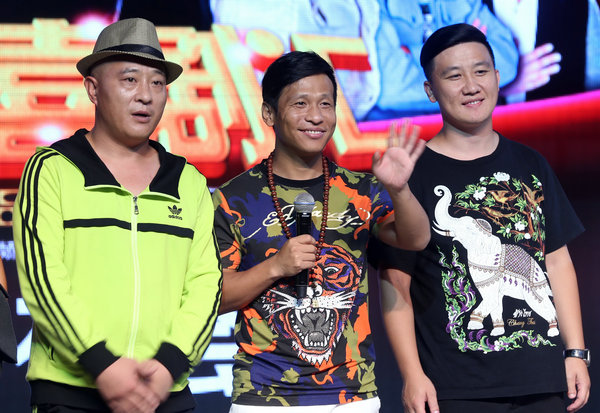
 |
|
Comedy actors (from left to right) Liu Xiaoguang, Song Xiaobao and Yang Bing lead the Liaoning Folk Art Troupe on a national tour. [Photo by Zou Hong/China Daily] |
Most of them dropped out of high school because of poverty. They were farmers before changing, ahem, their profession. They have appeared on TV and performed at various galas. To top it all, they have also performed on CCTV's Spring Festival Gala, the most-watched Chinese TV show. And, of course, they have made millions of people laugh. Meet the exponents of errenzhuan, a popular folk art form of Northeast China that involves singing and dancing, and is known for its humorous, improvisational and populist jokes.
The popularity of the comedians of Liaoning Folk Art Troupe exploded this year after they participated in the popular variety show, Happy Comedians, in which 10 groups of Chinese comic actors competed with each other. The Liaoning troupe emerged runners up at the end of the show in July.
Two months later, the troupe, led by Song Xiaobao and comprising Liu Xiaoguang, Shi Wensong and Yang Bing, landed in Beijing to announce its national tour, which started in Shijiazhuang, Hebei province, on Sept 26 and will wind across more than 30 cities, including Beijing, Shanghai and Chengdu, Sichuan province, till the end of December.
"A TV show is not enough. Our forte is improvisational performance and we interact with the audience during live shows to create more laughter," says 34-year-old Song.The troupe's skits, and the sitcoms it made for the TV show have been well received; now Song promises to add to those creative works.
People in Northeast China, or the Dongbei area, comprising the provinces of Heilongjiang, Jilin, Liaoning, are known for their straightforward and hospitable manners.
"It is said people from the Dongbei area are born with humor," says Song, referring to comic actor-director Zhao Benshan. "When we rehearsed, he used to be with us ... even till midnight and gave us advice."
Zhao, 57, was born in a small village in Liaoning province, and learned erhu (two-stringed bow instrument) and errenzhuan to make a living after losing his parents at 6. He rose to fame after performing a skit in CCTV's Spring Festival Gala in 1991.
With his heavy Dongbei accent and programs focusing on hot social topics, such as marriage of elderly people, family relationships and changes in life brought about by economic reform, he became one of the country's biggest comic stars.
"Northeastern folk culture and errenzhuan is in my bones," Zhao once said. "When I hum a tune, it is always from the Dongbei area."
While being devoted to spreading Dongbei culture and errenzhuan, Zhao is more of an entrepreneur than most of his peers. He has opened a restaurant and a theater called Liulaogen Guild Hall in Beijing's commercial area, Qianmen. He has also launched a media group, invested in TV series and movies, and opened a school to train errenzhuan performers.
Errenzhuan usually sees two people, a man and a woman, sing and dance holding fans or handkerchiefs in their hands. The art form used to be considered vulgar because some of the jokes were about sex, and its popularity had declined as audiences shifted to modern forms of entertainment.
Zhao has sanitized it by removing the erotic jokes and added new, contemporary elements to draw audiences. In 2007, Zhao led his "apprentices" on a tour of North America and performed errenzhuan in six cities, including New York, Los Angeles and Vancouver.
One of Zhao's most famous apprentices, Song was born in Tonghua, an industrial city in southern Jilin, and started learning errenzhuan at 19. He made a name for himself by collaborating with Zhao in a skit called Blind Date in the 2011 Spring Festival TV Gala of Liaoning.
"Comedy is hard. We are neither good-looking nor well-educated. It's a miracle for us to be welcomed by audiences," says Song.
If you go
7:30 pm, Oct 11. Mastercard Center, No 69, Fuxing Lu (Road), Haidian district, Beijing. 400-610-3721.

Presented by Chinadaily.com.cn Registration Number: 10023870-7
Copyright © Ministry of Culture, P.R.China. All rights reserved